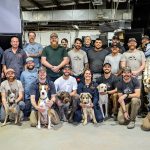Patagonia released details of its new standard for sourcing wool, addressing animal welfare concerns that prompted it to stop buying wool last year.
Patagonia halted all purchases of wool last year after the animal rights group People for the Ethical Treatment of Animals (PETA) released a video showing brutal treatment of sheep by Argentine ranchers who supplied the brand with merino wool.
In a July 26 post on its blog “The Cleanest Line,” Patagonia said its new wool standard adopts the provisions of the just released Responsible Wool Standard (RWS) as a baseline for animal welfare, but also goes above and beyond by calling for:
- Special animal welfare provisions covering transportation and off-farm slaughter, as well as stockperson training in compassionate handling, avoiding shearing injuries, acceptable age ranges for castration and tail docking and consistent availability of food and water.
- An audit process that exceeds the Responsible Wool Standard released by Textile Exchange last month. Patagonia’s standard requires audits be conducted in two phases: 1) during shearing, so that auditors can actually observe shearing practices and ensure standards are met, and 2) during lambing, so that auditors can witness the process of birth, tail docking, castration and all associated risks.
The new standard will be combined with Patagonia’s existing standards for responsible land management and quality to form its new proprietary wool standard.
In its blog post, Patagonia outlined steps it had taken over the last 10 months to “develop a new wool supply chain that reflects high, and verifiable, standards for both animal welfare and land management.”
Those efforts included engaging U.S. growers dedicated to humane treatment of animals, conducting in-depth field audits and consulting with animal welfare group Four Paws and Dr. Temple Grandin, a professor of animal science at Colorado State University, who has become well known as much for her battles with autism as her work improving the treatment of cattle.
“In the end, 33 individual pieces of criteria in the Patagonia Wool Standard came directly from Dr. Grandin, who also participated in a review of our near-final standard in recent months, and many more came from or were refined during a robust stakeholder review with Four Paws, independent auditors, farms in the United States and New Zealand, and other expert organizations and individuals,” Patagonia wrote on its blog.
Patagonia is now building a new supply chain. It has already partnered with the Imperial Stock Ranch in Wasco County, Oregon and the Red Pine Land and Livestock Company in Park City, Utah. Both ranches have “undergone third-party audits during shearing and lambing to date,” and Patagonia is “confident they will be excellent partners in upholding the rigorous criteria in the Patagonia Wool Standard.”
The two farms will supply Patagonia with wool for production of socks in future seasons.
“We continue to explore additional partners to round out our needs for merino baselayer and other products—all of which will undergo a full audit process under our new requirements,” the company said.














